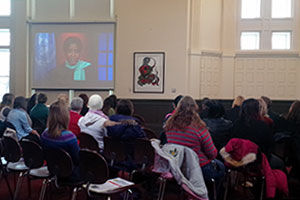Winnipeg becomes the first Canadian city to join UN Women’s Safe Cities Global Initiative
In Winnipeg, capital of the province of Manitoba, community stakeholders and government will work together to prevent sexual harassment and other forms of sexual violence in public spaces.Date:
“In our province, there are unacceptably high rates of sexual violence against women and it is only by acknowledging that there is a problem that we can then begin to speak about it openly and discuss solutions,” said Kerri Irvin-Ross, Manitoba Minister of Family Services and the Minister responsible for the Status of Women, on Human Rights Day, and the occasion of the launch of the Winnipeg Safe Cities Initiative, held at the University of Winnipeg on 10 December, 2013.

“By joining the Global Safe Cities Initiative today, Winnipeg becomes part of a growing global movement that says no to violence against women and takes concrete action,” Ms. Irvin-Ross said.
The Safe Cities Global Initiative includes two flagship programmes led by UN Women, other UN partners and global and local organizations. So far, more than 15 cities are participating in the Initiative. Winnipeg is the third city from a developed country, after Dublin, Ireland, and Sakai, Japan, to join this Global Initiative that aims to share experiences and strengthen or expand programming to prevent sexual violence in public spaces.
Scott Fielding, City Councillor and Chair of the Winnipeg Police Board, said “The adverse effects sexual violence has on women and girls are devastating, and it is my hope that education as part of a broader preventive approach will help mitigate this terrible epidemic. We have a lot of work ahead, but this is a step in the right direction.”
In a welcoming message to the city of Winnipeg, UN Women Executive Director, Phumzile Mlambo-Ngcuka, said: “You represent the first city and the first province in Canada to share your experience with us, and I hope it inspires others to follow and strengthen global efforts to ensure safe and sustainable cities for women and girls- and for all.”
Although important strides have been made in the province of Manitoba to prevent violence against women, particularly domestic violence, sexual violence in public spaces remains a major concern. According to Statistics Canada's Uniform Crime Reporting Survey 2012, Manitoba has the highest rate of sexual assault among Canadian provinces (115 per 100,000) and Winnipeg has the highest rate among Census Metropolitan Areas (91 per 100,000).
As a first step, the city of Winnipeg announced the creation of a Steering Committee to inform the development of the Safe City Initiative, comprised of both community and government stakeholders, including members from community-based organizations, the Winnipeg Police Service, local health services and the University of Winnipeg. Also participating are representatives of some of the groups most vulnerable to sexual harassment and assault in Manitoba's public spaces, including aboriginal women and young women.
Leslie Spillett, Director of Ka Ni Kanichihk, an indigenous-led organization providing services to indigenous women and families and member of the newly-created Steering Committee, said she hopes that this new policy-making exercise will bring increased attention to the challenges that aboriginal women and girls face.
“If we understand that sexual violence against indigenous women is perpetuated by extreme forms of marginalization, dispossession and alienation, then we have the potential of developing relationships and strategies that inform and direct public policy,” Ms. Spillett added. “Indigenous organizations are already doing great work within their communities, but often with very little structural support. It is essential to involve aboriginal professionals in the provision of services for victims and survivors of sexual violence. They know the values and practices that are embedded in our indigenous cultures.”
Stakeholders hope that by participating in this initiative, they will learn from other cities’ experiences in taking a strategic approach to prevention. Investing in measures that stop the violence from occurring in the first place will ensure that women and girls can contribute and benefit from a safe and sustainable Winnipeg for All.
Other cities participating in the Safe City Programme will also benefit from the experience of Winnipeg, which has hosted a number of noteworthy initiatives, such as the Community Notification Advisory Committee, and community-led, like Hollaback Winnipeg! – a crowd-sourced initiative as part of the Hollaback global effort– that aims to fight street harassment by using mobile technology and social networks.
“The Safe Cities Global Initiative is becoming a very effective knowledge-sharing platform,” says Anastasia Posadskaya-Vanderbeck, Advisor, UN Women Safe Cities Global Initiative. “I am convinced that all partners will benefit greatly from this new development.”
Related links:
From Kigali to Quito, a journey towards safer cities